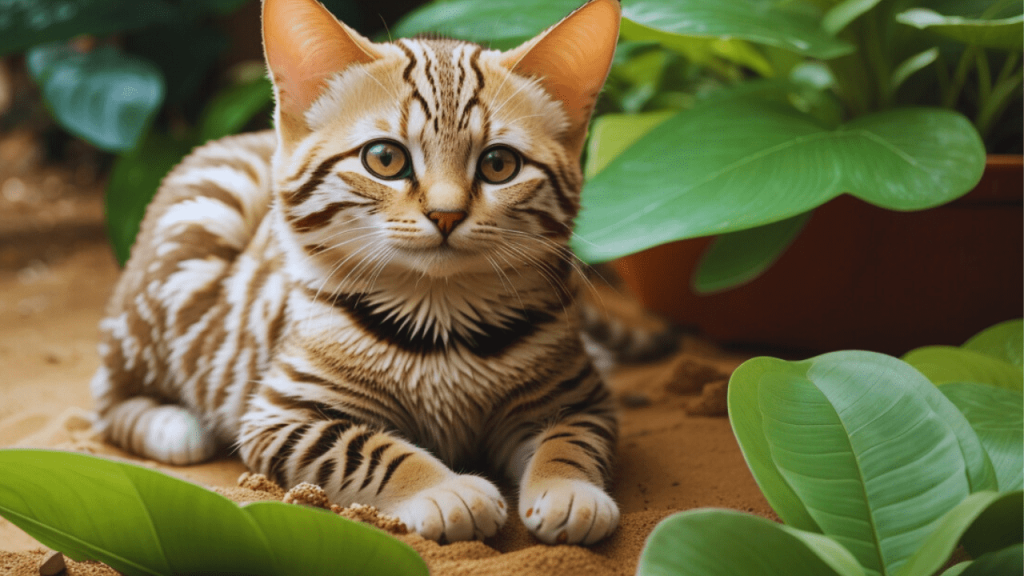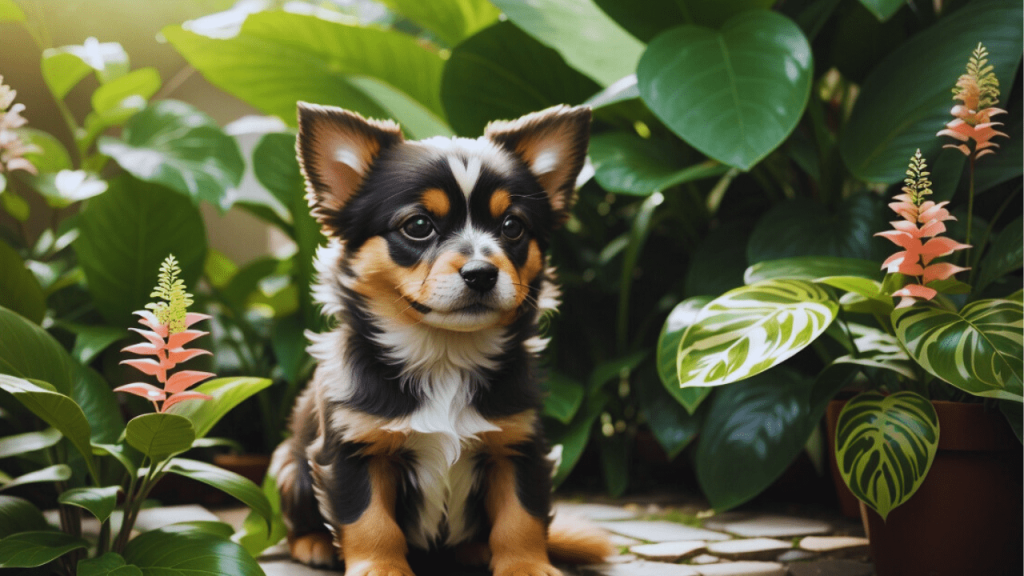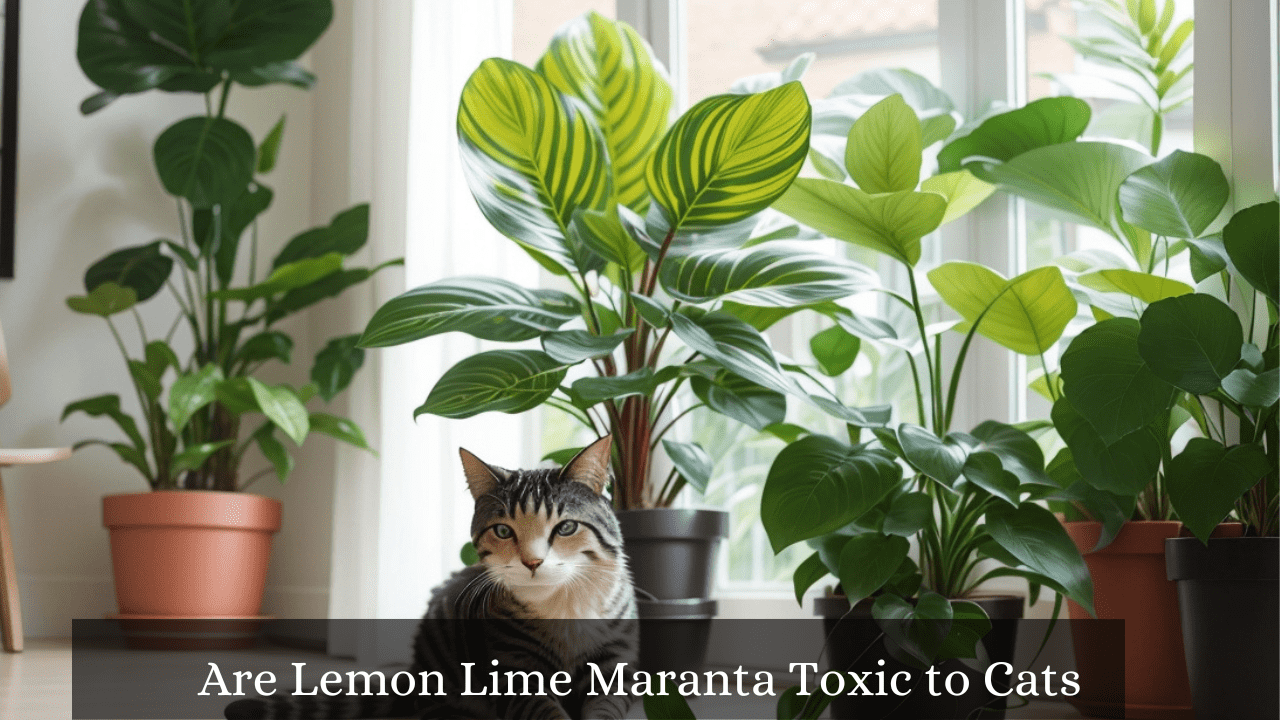Introduction
Lemon Lime Prayer Plants, also known as Maranta Lemon Lime, are beautiful indoor plants famous for their vibrant leaves. But did you know they can be harmful to people and pets, especially Maranta Lemon Lime cats (are lemon plants toxic to cats)? In this article, we’ll discuss these charming plants, the risks they may pose to cats, and how to care for them safely.
Table of Contents
The Alluring Lemon Lime Prayer Plant
People adore Lemon Lime Prayer Plants for their eye-catching leaves. These plants feature leaves with green and yellow colours, making them a favourite in many households.
Maranta plants, including the prevalent Maranta Lemon Lime, are generally considered pet-friendly houseplants. While they possess captivating foliage that can enhance your indoor space, they are not known to be toxic to cats and dogs. However, observing your pets around any houseplant is always wise to ensure they don’t chew on or damage the leaves. With proper care and a pet-safe environment, you can enjoy the beauty of Maranta plants while keeping your furry friends safe and happy.
Understanding the Dangers
Lemon Lime Prayer Plants are attractive but contain something called “oxalates” that can be troublesome if touched or consumed. Oxalates can lead to issues like:
Irritated Mouth
- Swollen tongue and lips
- A sensation of mouth burning.
- Excessive drooling
Stomach Upset
- Nausea
- Vomiting
- Diarrhea
Who’s at Risk? (Are Maranta Plants Toxic to Cats)
It’s important to know who might be affected by Lemon Lime Prayer Plants. Kids and pets like cats and dogs are naturally curious and may attempt to chew on the leaves. Therefore, extra care is needed if you have these plants, young children, or pets at home.
Lemon Lime Prayer Plant and Cats (Maranta Toxic to Cats)

Maranta Lemon Lime Cats
Are lemon lime maranta toxic to cats?
The Lemon Lime Maranta Plant, also known as Maranta leuconeura ‘Lemon Lime,’ can harm (maranta toxic to cats) cats if ingested. Here’s a simplified explanation of why:
Tiny Irritating Crystals: This plant contains small, needle-like oxalate crystals that can cause mouth, tongue, and stomach discomfort in cats.
Eating Trouble: Chewing on this plant can release these crystals, leading to symptoms such as sore mouths, drooling, pawing at their mouth, or vocal discomfort.
Vomiting and Stomach Issues: Cats might vomit or experience tummy problems due to these crystals.
While this plant isn’t hazardous to cats, it can still make them feel unwell. It’s best to keep your cat away from this plant and observe them around other plants. If your cat consumes some and appears sick, consult your vet for advice and assistance.
Lemon Lime Prayer Plant and Dogs

The Maranta leuconeura Lime can mildly affect dogs. Here’s a simplified explanation of why it can be problematic for dogs:
- Tiny Crystals: This plant has tiny crystals in its leaves and stems.
- Eating It: If a dog nibbles on this plant, it can release these crystals.
- Causes Discomfort: These crystals can make a dog’s mouth, tongue, and stomach feel uncomfortable.
- Warning Signs: If dogs eat the plant, they might start drooling, pawing at their mouth, throwing up, or having diarrhea.
While it typically won’t make dogs very sick, keeping this plant away from them is still better to be safe. To protect dogs, place the plant where they can’t reach it or use barriers to keep them away. Consulting a vet is advisable if a dog seems unwell after interacting with this plant.
Caring for Your Lemon Lime Prayer Plant
Now that we understand the risks let’s explore how to care for your Lemon Lime Prayer Plant safely:
Where to Place It
- Place it where children and pets can’t reach it.
- Position it in a well-lit spot, but avoid direct sunlight.
Watering
- Maintain moist, not soggy, soil.
- Use clean, mineral-free water.
Trimming
- Prune dead or yellow leaves to promote growth.
- Wear gloves to avoid contact with harmful substances.
Soil and Pot
- Use well-draining soil to keep the roots healthy.
- Repot into a larger container when it outgrows its current one.
Enjoying the Beauty Safely
By taking proper care of your Lemon Lime Prayer Plant and being aware of potential dangers, you can appreciate its beauty without worry. Remember, safety is paramount when it comes to these plants, and being cautious ensures the well-being of everyone involved.
Conclusion
The lovely Lemon Lime Prayer Plant can pose safety concerns for people and pets due to the discomforting oxalates in its leaves. This is especially important if you have curious children or pets like cats and dogs. While it’s not extremely dangerous, it’s best to be cautious. Keep it out of reach, watch for any interactions, and provide other distractions to enjoy its beauty safely. Prioritizing care and safety ensures a peaceful and pleasant indoor environment for everyone.
FAQs (Frequently Asked Questions)
Are lemon lime maranta toxic to cats?
Yes, Lemon Lime Maranta plants can be harmful (maranta toxic to cats) to cats. They contain insoluble calcium oxalate crystals that, if ingested, can lead to mouth and stomach discomfort in cats, including symptoms such as drooling, vomiting, and diarrhea. Keeping these plants out of your cat’s reach ensures their safety.
How can I keep my cat away from Maranta Lemon Lime plants?
You can keep the plant out of your cat’s reach, use pet-friendly barriers or deterrent sprays, provide alternative distractions, and monitor your cat’s behavior around the plant.
Is Lemon Lime Prayer Plant save for cats?
No, Maranta Lemon Lime plants can be harmful to cats due to the presence of insoluble calcium oxalate crystals.
What happens if my cat chews on Maranta Lemon Lime leaves?
Chewing on Maranta Lemon Lime leaves can lead to mouth and stomach discomfort in cats, including symptoms like drooling, vomiting, and diarrhoea.
Can cats recover from Maranta Lemon Lime toxicity on their own?
Most cats will recover with care, but it’s crucial to consult a vet for advice and assistance if your cat shows symptoms of ingestion.

